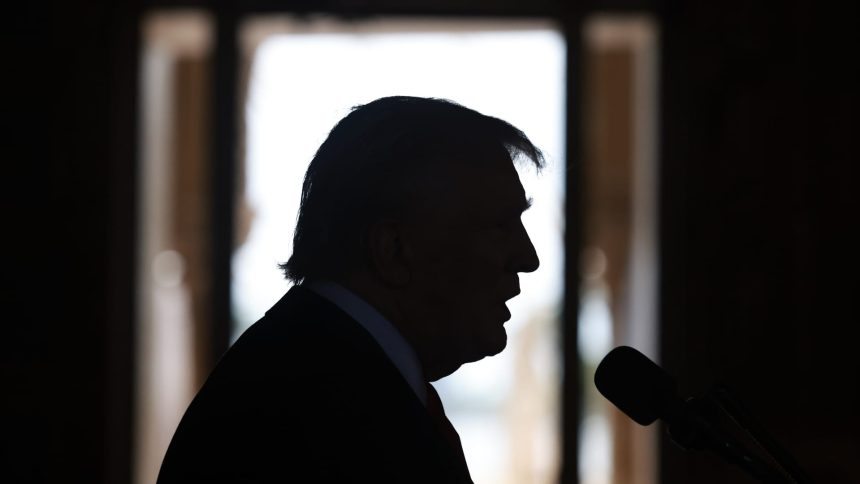Former President Donald Trump said Thursday that he plans to stay off the presidential campaign rally circuit until after the Democratic National Convention, which ends Aug. 22.
Speaking at a wide-ranging press conference at his home in Palm Beach, Florida, Trump was asked by a reporter why he had not been “campaigning this week.”
“Because I’m leading by a lot and because I’m letting their convention go through and I am campaigning a lot,” Trump replied.
The reporter followed up: “Are you going to pick up your travel?”
“After their convention, yeah,” Trump replied, referring again to the Democratic convention, which begins Aug. 19.
The pace and the plan for the Republican presidential nominee’s August this year is a stark departure from what Trump’s schedule looked like in August of 2016, the last time he campaigned for president in person.
That month, Trump held 27 raucous campaign rallies across 15 states. When he wasn’t filling stadiums, Trump seemed to live on his plane, jetting between battleground states and fundraisers and phoning in to interviews — all while running his family’s real estate business.
By contrast, Trump has only held one rally so far this month.
Meanwhile, Trump’s Democratic opponents, Vice President Kamala Harris and her running mate, Minnesota Gov. Tim Walz — as well as his Republican running mate, Ohio Sen. JD Vance — have all spent the week barnstorming presidential battleground states.
After debuting their partnership Tuesday night at a rally in Philadelphia, Harris and Walz spoke at rallies in Wisconsin and Michigan on Wednesday and Thursday. The pair will head to events in Arizona on Friday and Nevada on Saturday. All five states are highly competitive in November’s election.
For the past five days, Trump has been at his resort, Mar-a-Lago, where he has conducted phone interviews and podcasts, and where he held Thursday’s hourlong press conference.
His public schedule also appears to confirm his stated plan to cut back on rally travel in the coming weeks. The only event currently posted on the Trump campaign website’s “Events” page is a rally on Friday in Montana that will partly benefit GOP Senate candidate Tim Sheehy.
Sheehy is hoping to unseat incumbent Democratic Sen. Jon Tester in November, and Trump’s appearance is likely to energize Republicans in the deep red state.
While he is in Montana, Trump will attend a campaign fundraiser. Then he will stop in Aspen, Colorado, on Saturday for another fundraiser before returning to Florida.
CNBC reached out to the Trump campaign to confirm that the Republican nominee does not plan to resume large, in-person presidential campaign rallies until after the Democratic convention.
“President Trump has a robust, travel schedule — consisting of rallies, messaging events, and fundraisers in the next week. He has held more campaign events than [Harris] and Walz combined,” Trump spokesman Steven Cheung told CNBC.
With less than 13 weeks to go before Election Day, polls are showing the presidential race in a statistical dead heat. This makes Trump’s decision not to ramp up his campaign into a full-swing state blitz all the more unusual. It also raises the prospect that Trump could be missing important opportunities to connect with voters he needs to engage with to have the best shot at victory in November.
Typically, the last three months of a presidential campaign are a sprint to the finish, starting with the party’s nominating convention in mid-summer, and ending on a Tuesday in early November.
For a good example of how this sprint traditionally plays out — and of how effective it can be — consider Trump’s successful 2016 race for the White House.
Eight years ago this month, Trump held more than 20 rallies spanning over a dozen different states.
Between Aug. 9 and 13 alone, Trump fired up huge crowds at seven major campaign rallies: Two each in the battleground states of North Carolina, Florida and Pennsylvania, with an additional rally in Connecticut, a Democratic stronghold.
Trump would go on to flip Florida and Pennsylvania in November, two states that Democrat Barack Obama had won in 2012. He also swept North Carolina, which Obama had won in 2008. It all added up to a victory for Trump against former Secretary of State Hillary Clinton.
In 2020, in-person campaign rallies on both sides were largely suspended because of the Covid pandemic.
So far this month, Trump has traveled to Atlanta for a rally on Aug. 3. The day before that, he attended a fundraiser in the Hamptons, New York’s tony beach enclave.
Rather than attend back-to-back rallies like he did during his first campaign, Trump — who in July survived an assassination attempt at a campaign rally in Pennsylvania — has recently participated in several media interviews.
He was interviewed by controversial influencer Adin Ross via livestream on Monday, he called into the Fox News morning show “Fox & Friends” on Wednesday morning, and has said he will be interviewed by billionaire Tesla CEO Elon Musk next week.
Read more: 2024 U.S. presidential election
Meanwhile, Trump’s running mate Vance has assumed a more visible and traditional schedule on the campaign trail.
En route to an event in Philadelphia Tuesday, Vance defended Trump’s decision to forgo an August blitz, telling reporters that he and Trump are deploying a “divide and conquer strategy.”
“One of the things you’ve got to do is, of course, get out there and speak to people and speak to reporters,” the senator said. “A final thing you have to do, of course, is raise the resources. I know the president is very busy doing exactly that.”
“Sometimes we obviously do events together,” Vance said. “But I think we’re going to use the fact that we have two people who can both get out there and prosecute a message.”
In an effort to counter-program Harris and Walz’s campaign stops this week, Vance spoke in Michigan and Wisconsin on Wednesday. He had also planned to hold two events in North Carolina on Thursday but postponed them due to the tropical storm.
None of Vance’s campaign stops this week are being billed as rallies, however. Instead, they have been staged as “remarks to the press,” with only small groups of staff, reporters and supporters in attendance.
Don’t miss these insights from CNBC PRO
Read the full article here




